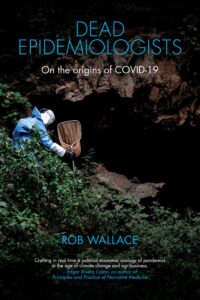Dead Epidemiologists: On the Origins of COVID-19
REVIEWS, 12 Oct 2020
Rob Wallace | Monthly Review - TRANSCEND Media Service
Dead Epidemiologists: On the Origins of COVID-19 by Rob Wallace, Sep 2020, 260 pp.
14 Oct 2020 Issue – The COVID-19 pandemic shocked the world. It shouldn’t have. Since this century’s turn, epidemiologists have warned of new infectious diseases. Indeed, H1N1, H7N9, SARS, MERS, Ebola Makona, Zika, and a variety of lesser viruses have emerged almost annually. But what of the epidemiologists themselves? Some bravely descended into the caves where bat species hosted coronaviruses, including the strains that evolved into the COVID-19 virus. Yet, despite their own warnings, many of the researchers appear unable to understand the true nature of the disease—as if they are dead to what they’ve seen.
Dead Epidemiologists is an eclectic collection of commentaries, articles, and interviews revealing the hidden-in-plain-sight truth behind the pandemic: Global capital drove the deforestation and development that exposed us to new pathogens. Rob Wallace and his colleagues—ecologists, geographers, activists, and, yes, epidemiologists—unpack the material and conceptual origins of COVID-19. From deepest Yunnan to the boardrooms of New York City, this book offers a compelling diagnosis of the roots of COVID-19, and a stark prognosis of what—without further intervention—may come.
**************************
“Crafting in real time a political-economic ecology of pandemics in the age of climate change and agribusiness.”
“This is a book of truth, that kind that sets us free by cutting through the bindings of lies and ignorance. In this moment of cascading crises, it is necessary to find the truth, which is never what’s on the surface. We are fortunate, indeed, that Rob Wallace has been preparing for now, plunging into subjects as varied as ecology and political economy so that he can articulate the scope of our problems. That he can see the truth is amazing. That he can write about it with grace and humor eases the shock of seeing the real through the haze of our false consciousness. Read this book as if your life depended on it, because it does.”
“Name one other epidemiologist who knows his N.K. Jemisin as well as his Gramsci and Arrighi, who understands the broad colonial relations of corporate capitalism as well as the detailed “epizoological perversities” of the factory farm—and who can write about it all with such perfect, pissed-off, punk-rock eloquence and fury. In his brilliance and in the extraordinary depth, range, and courage of his thinking, Rob Wallace is unique. From the plantation-era roots of the contemporary horseshoe-crab-blood-mining industry—yeah, you read that right—to the reproductive cycle of the Chinese horseshoe bat, Dead Epidemiologists makes sense of the COVID-19 pandemic like no other work I’ve encountered anywhere, as a disease that exists in and arose out of the globalized dystopia in which we already live. This is radical thinking in the very best sense: Wallace is unwilling to accept the rigged and homicidal terms of the world we’ve been given. He insists on no less than the birthing of a new one, or better yet, a return, in solidarity, humility, and love, to the planet that we already have.”
“If Big Farms Make Big Flu was an eye-opener, Dead Epidemiologists has taken the analysis to a completely different level of sophistication. The breadth and depth of issues considered with authority and perspicacity in the new collection of essays makes this book essential reading. It is also a devastating critique of the failures of mainstream epidemiologists. The scientific literature on COVID-19 and other pandemics largely ignores the role of capitalist production as “a causal factor in the production of invasive species.” This book sets the context for understanding how neoliberal capitalism is generating its own nemesis and threatening the annihilation of billions of people. But it also shelters hope in the organising capacity of peasant and small farmer movements. This book deserves to be in everyone’s hands.”
_____________________________________________
Go to Original – monthlyreview.org
Tags: COVID-19, Coronavirus, Literature, Pandemic, Reviews, Science and Medicine
DISCLAIMER: The statements, views and opinions expressed in pieces republished here are solely those of the authors and do not necessarily represent those of TMS. In accordance with title 17 U.S.C. section 107, this material is distributed without profit to those who have expressed a prior interest in receiving the included information for research and educational purposes. TMS has no affiliation whatsoever with the originator of this article nor is TMS endorsed or sponsored by the originator. “GO TO ORIGINAL” links are provided as a convenience to our readers and allow for verification of authenticity. However, as originating pages are often updated by their originating host sites, the versions posted may not match the versions our readers view when clicking the “GO TO ORIGINAL” links. This site contains copyrighted material the use of which has not always been specifically authorized by the copyright owner. We are making such material available in our efforts to advance understanding of environmental, political, human rights, economic, democracy, scientific, and social justice issues, etc. We believe this constitutes a ‘fair use’ of any such copyrighted material as provided for in section 107 of the US Copyright Law. In accordance with Title 17 U.S.C. Section 107, the material on this site is distributed without profit to those who have expressed a prior interest in receiving the included information for research and educational purposes. For more information go to: http://www.law.cornell.edu/uscode/17/107.shtml. If you wish to use copyrighted material from this site for purposes of your own that go beyond ‘fair use’, you must obtain permission from the copyright owner.

